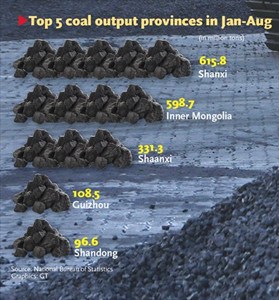
Economic downturn hurts major users in metal, electricity industries
Hidili Industry International Development Ltd, a leading private-sector coal company based in Southwest China's Sichuan Province, may not be able to repay $183 million in debt due on Wednesday, a situation that experts said underscores the difficulties that many domestic coal companies face.
The coking coal producer said it would be unable to repay a six-month bond totaling $190.6 million of principal and interest with a coupon rate of 8.625 percent that was to fall as of Wednesday, according to a statement the company released on Friday.
Hidili said in the statement that it had defaulted on 6 billion yuan ($947 million) in loans as of June 30. In addition, an affiliated company defaulted on a 289.6 million yuan bank loan.
More coal companies will default due to sluggish industry conditions amid an economic downturn, experts said.
"The ongoing economic structural transformation in China has put heavy pressure on the secondary industry including the coal sector," Liu Xuezhi, an analyst at Bank of Communications, told the Global Times on Tuesday.
Liu noted that a transformation is also taking place within the coal sector. "The government is calling for industries with low rates of energy use and low levels of pollution," he said.
"But the traditional coal industry is in the opposite situation," Liu added.
More than 70 percent of China's large- and medium-sized coal companies lost money in the first half of this year, news portal people.com.cn reported on October 8, citing the China National Coal Association.
Companies in North China's Hebei Province, East China's Shandong Province and East China's Anhui Province were worst affected, it said.
The asset-liability ratio in the coal sector has been rising, reaching 52.57 percent as of the end of the third quarter, up 1.58 percentage points year-on-year, according to a report released Tuesday by Shenwan Hongyuan Securities Co.
Analysts attributed the coal industry's difficulties to declining demand caused by a prolonged economic downturn and excessive supply.
China's economy grew 6.9 percent year-on-year in the third quarter, down from 7 percent in the first two quarters and 7.4 percent for the whole of 2014, according to the National Bureau of Statistics.
However, national coal production increased nearly 19 percent from about 3.2 billion tons in 2010 to 3.8 billion tons in 2014, the China Business Journal reported on October 14.
"The slowed economy has hit the iron and steel industry as well as the electric power industry, which are the main users of coal," Guan Dali, an analyst at commodity information provider Zibo Zhongyu Information Technology Co, told the Global Times on Tuesday.
large- and medium- sized iron and steel enterprises saw a total loss of 28.1 billion yuan in the first three quarters, the Beijing-based China Iron and Steel Industry Association said on October 28.
The demand for electricity in China has been softening in recent years and the growth rate is likely to further fall to around 2 percent by 2015, the lowest point since 1998, the Economic Information Daily reported on September 22, citing Wang Zhixuan, the secretary-general of the Beijing-based China Electricity Council.
Guan noted that existing overcapacity plus new capacity have led to an imbalance between supply and demand, causing a further decline in coal prices.
The possible default in the coal industry follows similar problems in the iron and steel industry.
A core subsidiary of State-owned Sinosteel Corp announced on October 19 that it would delay payment of interest on its 2 billion yuan bonds, leading to the first debt default in the industry.
"Some of these companies have too much debt," Guan said.
Guan noted that the whole coal industry will decline, saying that "there will be a reshuffle in the industry as small and high-cost producers disappear."
Liu believed that more bond defaults will occur among Chinese enterprises, especially those in the private sector.
"But in a market-oriented economy, it is natural that there are some bond defaults, which can help investors to improve their risk awareness," according to Liu.


















































